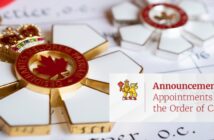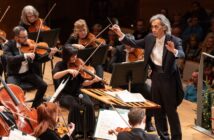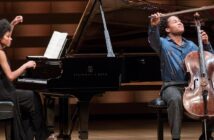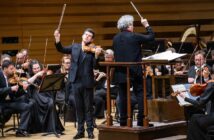
This page is also available in / Cette page est également disponible en:
![]() Francais (French)
Francais (French)
Nobody was expecting what is happening at the moment. Like all organizations, schools and universities had to adapt. Masks and hand sanitizer are required in every building. Protocols have been developed in response to the pandemic, at the price of much hardship for many people.
“We had to go through a fairly big process within the university for safety protocols,” says Patrick Carrabré, director of the University of British Columbia school of music. “A lot of time was spent with cleaning procedures: what kind of wipes can you use on a piano, etc.”
Most music schools and faculties across the country are offering face-to-face as well as online education in a blended model. There has been a general push for all music theory and music history classes and seminars to go online. One-on-one, in-person instrument and voice lessons are the most difficult elements of musical training to transition into a remote environment.
Just rethinking the use of the premises for ensemble rehearsal and individual practice has been a real puzzle. As a matter of fact, the in-person option for orchestra, band, choir and opera rehearsals often depends on the size of the facilities at the institution’s disposal.
Some schools, such as UBC’s, have been privileged to have access to larger buildings and therefore can manage in-person ensemble rehearsals. As for Université de Montréal, the music faculty extended the stage of Salle Claude-Champagne to give students the possibility of working in groups.
“We tried to bring the orchestra and other instrumental or vocal ensembles together as much as possible to ensure that we maintain a certain faculty life for our students,” explains dean Nathalie Fernando. Other schools, like Western University’s Don Wright Faculty of Music, are offering ensemble courses in a blended model – online and in-person – without having meetings of the full group.
While it is not a policy they necessarily wish to pursue after the pandemic, Concordia University’s department of music decided that instead of cancelling the season, they would embrace the idea of the virtual ensemble in their curriculum. “All the musicians around the world who are isolated do the same thing, they cannot play together so they play virtually,” says dean Mark Corwyn. “There is a lot we can learn from that process.” The Schulich School of Music at McGill University is also offering virtual ensembles at the moment but will implement in-person large and small ensemble activities starting in January.
Regarding classrooms and practice rooms, they can only be used by a certain number during a certain time. For some universities, depending on the efficiency of the air circulation systems, students and staff have to wait up to 45 minutes between activities. That is to say that a student can use a practice room for 45 minutes and must leave it vacant for 45 minutes before the next student arrives. In addition, in order to accommodate one-on-one, in-person lessons, institutions have to implement a multitude of new physical setups such as plexiglass sheets for brass and voice lessons.
One positive side of remote teaching is that institutions are reaching out to guest lecturers from around the world and are also rethinking the way they train students. “We normally have quite a few lectures and masterclasses given by guests from outside the university but this term we have been able to expand that significantly and have 90 international guests just for the fall semester,” says Brenda Ravenscroft, dean of McGill University’s Schulich School of Music. “Because we are doing so much of the teaching remotely, we have been thoughtful about learning and what it is that we really need the students to learn and how we can teach that best.” Also, the current situation forces most institutions to webcast concerts, which means that many faculty concerts and students recitals are now available to the general public to watch online.
Even though university life is limited to what can be done in a time of pandemic, institutions do their best to enable music students to maintain training. “Students want to be heard making music and they are working hard to keep safe and healthy,” says Betty Anne Younker, dean of the Don Wright Faculty of Music. “When they first came back to the faculty and were able to make music, there was much emotion. People can email me if they have concerns but most of the emails I get are from students just thanking the faculty for making the spaces available for them to keep going. It is quite touching.”
This page is also available in / Cette page est également disponible en:
![]() Francais (French)
Francais (French)














